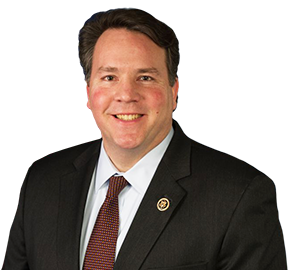US Rep. Alex Mooney meets with WV constituents to discuss Iran nuclear deal
U.S. Rep. Alex Mooney, R-W.Va., spent Sunday, Aug. 3 gathered around a conference table discussing the recently proposed Iranian nuclear deal with concerned constituents.
Dr. David Abramowitz, a physician in Charleston, facilitated the discussion. In his opening remarks, Abramowitz said the deal is a bad deal for several reasons: the administration promised anytime, anywhere inspections. Now, it is anytime, anywhere, with Iranian approval and 24-day notice; Iran is supposed to come clean on their nuclear program. The International Atomic Energy Agency, or IAEA, submitted 12 questions to the Iranians who answered half of one, he said. They have not come clean with what they’ve done in the past so we don’t have any baseline on what to monitor in the future, Abramowitz said; the agreement is very short. After 10 or 15 years, the Iranians can do what they want. The agreement is based on time, not behavior, he said; Most of the sanctions will be eliminated and the Iranians will $150 billion funneled into their economy; in essence, the nuclear infrastructure of Iran will stay intact.
Abramowitz said, additionally, Iran will be in the position to buy conventional and ballistic weapons in eight years.
“This was never in the initial agreement and when we bring up side issues like Americans in jail in Iran, they say, ‘This was not part of the deal,”’ he said. “This was not part of the deal either.”
If the deal were to come to fruition, Abramowitz said Iran would be legitimatized as a nuclear threshold state, the prospect of war would be raised, the region would become more volatile and Iranian support of terror would increase due to more funds coming in and a strengthened economy.
Wesley Walker said it’s not Iran Americans should be the most worried about, but Pakistan.
“Pakistan is a much bigger threat and it has many nuclear weapons already,” he said. “ISIS is a bigger threat than Iran and it’s a continual threat. … It’s an active threat.”
He suggested the lack of a deal would trigger war. Most in the room disagreed.
Allan Snider said “if you want to avoid war you have to be willing to go to war,” and by taking that theoretical option off the table, the Obama administration has “exposed the soft underbelly of America.”
Many in the room also expressed reservations about trusting Iran, in light of agreements made and then broken and amid chants of “Death to America” and “Death to Israel.” Margot Jogwick, of German descent, was alive and personally witnessed the rise and ultimately fall of Hitler, said the deal is a “sell-out.”
“It reminds me of 1938 when people were impressed with Heil Hitler,” she said. “We heard no more war, peace in our time.”
Others in the audience said we are dealing with a people who do not wish to abide by the deal and are dedicated to the destruction of the West and Western values. The side deal with the IAEA no one knows the details of was another point of concern, along with the fact the deal was taken to the United Nations before Congress had a say on it, According to the agreement, the U.S. would be obligated to come to Iran’s defense were their nuclear program ever to come under siege, audience members said.
Most agreed going back to the negotiating table was necessary but how to do that was another matter.
At the very least, Mooney said keeping the sanctions in place is a vital step. He said they have worked because Iran has been unable to economically spread and expand terrorism and their anti-American goals.
Others in the audience, however, expressed concern if the U.S. would be the only country to keep sanctions in place. The deal between Iran and the United States, Russia, China, France, the United Kingdom and Germany would give Iran relief from economic sanctions in return for limits and inspections on it nuclear facilities. Reports have surfaced that indicate Russia and China have already began to assert a business presence in Iran and that every other country is ready to accept the deal. If the United States were to not accept the deal and keep its sanctions in place while every other country lifted theirs, audience members expressed concern that the U.S. presence would decrease, making things worse.
Mooney said he doesn’t buy the idea the United States has to have a deal.
“If the other side knows you have to have a deal, they’re going to roll you,” he said.
He said he learned, during the discussion, that there are some very spirited views, it’s a contentious issue and there are a lot of details people are not sure of and concerned about.
“Overall, there are a lot of concerns,” he said. “I share a lot of those concerns.”
He also said some seem to be willing to take more of a risk with the deal than others and there was a little more willingness to trust a historic enemy of the United States than anticipated.
“If a country is saying they want to wipe Israel off the map, why would you take the risk?” he asked.
With a vote coming up mid-September in Congress to either accept or reject the deal, Mooney said it’s essential he listens to his constituents.

